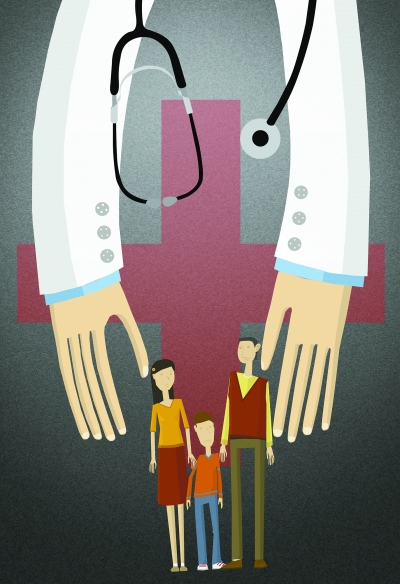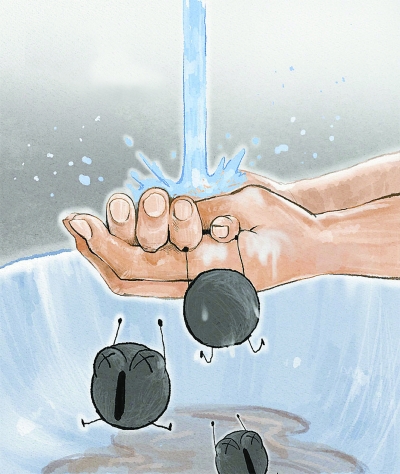The child is ill during the epidemic. Should he go to the hospital?


Du Yanyan Helan
During the epidemic, many parents have made it difficult for their children to go to the hospital when they are sick. Some parents became "doctors" themselves and turned over the medicines at home; Some parents give their children "armed to the teeth" and are still trembling; Some parents simply see a doctor for their children, which makes it difficult to make a definite diagnosis.
At present, when the child is sick, under what circumstances should he seek medical advice in time; How to judge whether the child is infected with COVID-19; Should the vaccine be vaccinated on time … … For parents’ questions, pediatricians gave a series of suggestions.
What symptoms should be vigilant about COVID-19?
Headache, brain fever, cough, runny nose, vomiting and diarrhea are common diseases of children. However, if these symptoms appear during the epidemic, we should be alert to whether they are related to COVID-19.
When parents find that their children have fever, cough and other symptoms, first of all, don’t panic. Only those who meet the following conditions will be highly suspected of having COVID-19.
1, within 14 days before the onset of Wuhan city and surrounding areas, or other cases reported in the community travel history or residence history;
2, within 14 days before the onset of contact with Covid-19 infected people (nucleic acid test positive);
3. Within 14 days before the onset of the disease, you have been exposed to patients with fever or respiratory symptoms from Wuhan and its surrounding areas, or from communities with reported cases;
4. Aggregative onset.
In addition, due to the similarity of symptoms, it is easy to be confused. In fact, there are the following main differences between colds, flu and COVID-19.
The pathogens of cold are rhinovirus, respiratory syncytial virus, parainfluenza virus, adenovirus, etc., which can occur all year round. Its main symptoms are runny nose, stuffy nose, sneezing, no fever or low to moderate fever, the course of disease is about 3 days, and it can heal itself.
The pathogens of influenza are influenza A and B viruses, and the peak incidence is in winter and spring. Its symptoms are high fever, accompanied by chills, headache, muscle pain and fatigue. The course of the disease is about one week. Oseltamivir is a specific drug against influenza virus.
The pathogen of COVID-19 was Covid-19 in 2019, and the onset time began at the end of 2019. Its symptoms are mainly fever, fatigue and dry cough, and a few patients are accompanied by nasal congestion, runny nose, sore throat and diarrhea. Severe patients often have dyspnea and/or hypoxemia after one week of onset, and severe patients quickly progress to acute respiratory distress syndrome, septic shock, metabolic acidosis and coagulation dysfunction and multiple organ failure. The symptoms of this disease vary, and children are mainly mild. At present, there is no specific drug, and the treatment is mainly symptomatic, so it is necessary to actively prevent and treat complications.
What circumstances need to take the child to the doctor as soon as possible?
In order to avoid cross-infection, it is correct for parents to take their children to the hospital less during the epidemic. But if the child really has an emergency, it can’t be delayed.
Under what circumstances do you need to take your child to see a doctor as soon as possible?
1. The baby under 3 months has fever symptoms, that is, the body temperature exceeds 37.3℃;
2, children over 3 months, the body temperature is higher than 40℃;
3. Children under 2 years old have a fever for more than 24 hours, and children over 2 years old have a fever for 2 to 3 days, and they cannot independently reduce their fever;
4. After the fever, the mental reaction is still weak, lethargy, crying, and severe respiratory symptoms, such as wheezing, increased respiratory rate, and hoarseness;
5, severe abdominal pain or vomiting, diarrhea, and dehydration symptoms such as less urine, no tears when crying, and depression of the anterior fontanel;
6, fever with convulsions, or recurrent seizures.
We understand many parents’ inner entanglements. On the one hand, they can’t take their children to see a doctor; on the other hand, they feel that the hospital is a high-risk place, and they are worried that their children will be infected with COVID-19. This requires parents to weigh the pros and cons. If it is a disease that must be treated, don’t hesitate to see a doctor in time for the health of the child.
At present, all major hospitals in Beijing strictly implement the system of pre-examination and triage. For suspected COVID-19 cases, there are separate consultation areas and relatively independent routes from consultation to inspection and examination. As long as you protect yourself and your children, it is still safe.
Can the vaccine be postponed?
Newborns are the key targets of epidemic prevention and control. Because of their low immunity, more attention should be paid to problems. Under normal circumstances, newborns rarely have fever. Once fever occurs, we should attach great importance to it. It is not recommended to observe at home, and we need to go to the hospital for pediatric treatment immediately.
If the mother is unfortunately infected with COVID-19 or in the suspected period, she should be isolated from the newborn, and breastfeeding is not recommended. Any family member with suspicious contact history or similar clinical symptoms to COVID-19 should avoid contact with newborns.
If there are no special circumstances, it is recommended to postpone the physical examination of newborns for 42 days. So, what about infants who need to be vaccinated? According to the advice of the CDC on vaccination, parents can communicate with community vaccination sites when to vaccinate, but there are two situations where vaccination cannot be postponed.
First, the second and third doses of hepatitis B vaccine for newborns born to mothers with positive hepatitis B surface antigen. It is recommended to vaccinate in time after making an appointment with the vaccination unit.
Second, rabies and tetanus vaccines should be vaccinated in time.
The inoculation of other vaccines can be selected according to the specific requirements of the epidemic situation in the community and relevant institutions. Before going to the inoculation point, learn about the vaccination clinic online or by telephone to minimize the gathering of people.
Follow-up visit for children with chronic diseases according to their condition changes.
During the epidemic period, children with chronic diseases can postpone the return visit appropriately, but they should follow the doctor’s assessment of the child’s condition and should not make decisions without authorization.
Parents can monitor their children’s condition under the guidance of doctors, maintain the continuity and effectiveness of treatment, and reduce the number of visits to hospitals. If the child’s condition changes or even worsens, he must see a doctor in time.
For the safety protection of children during the epidemic period, our general suggestion is to try not to take children out of the house, and be sure to do a good job of protection when going out, but don’t go to public places or confined spaces, visit relatives and friends, and don’t contact people with respiratory infection symptoms.
When children must go out, try to wear a special mask for children all the time, and parents should always pay attention to whether their children have any discomfort such as dyspnea. Pay attention to dress appropriately when going out, don’t cover up the heat or catch cold, try not to take public transportation and stay away from others as far as possible (more than 1 meter away). At the same time, parents should take careful care to prevent their children from groping, biting their fingers, rubbing their eyes and picking their nostrils outside. Parents are advised to carry alcohol cotton balls, disinfectant wipes, etc. with them to clean their hands at any time.
Parents change clothes and wash their hands immediately when they get home.
Parents who need to go to work and go out to buy food are also at risk of infection, so they should change their clothes and shoes immediately after going home, and wash their hands carefully before they can get close to their children. When coughing or sneezing, cover it with a paper towel or elbow, throw the contaminated paper towel into the trash can, and then wash your hands or arms carefully. Family members should avoid sharing tableware and towels with their children, don’t feed their children after blowing cold food with their mouths, don’t kiss their children, and don’t exhale and pant at close range. Children’s articles, toys and tableware should also be disinfected regularly.
At home, parents should keep the family clean and hygienic. Regularly ventilate every day, and move the child to another room during ventilation to avoid catching a cold. At the same time, educate children to wash their hands frequently, and wash their hands with hand sanitizer or soap after meals, games, coughing or sneezing, and contact with saliva secretions.
Older children can learn the seven-step washing method. The first step: combine your hands and rub them palm to palm; Step 2: Interlace your fingers and rub your palms against your back; Step 3: Interlace your fingers and rub your palms against each other. Step 4: Hold hands with each other and rub your fingers with each other; Step 5: Turn your thumb in your palm and exchange your hands; Step 6: Rub your palms with your fingertips and exchange your hands; Step 7: Hold your wrist and rub it, and exchange your hands.
(Author: Pediatrician, Chang Gung Memorial Hospital, Tsinghua, Tsinghua University)